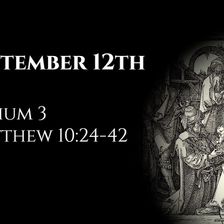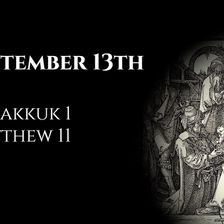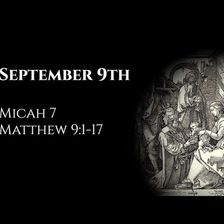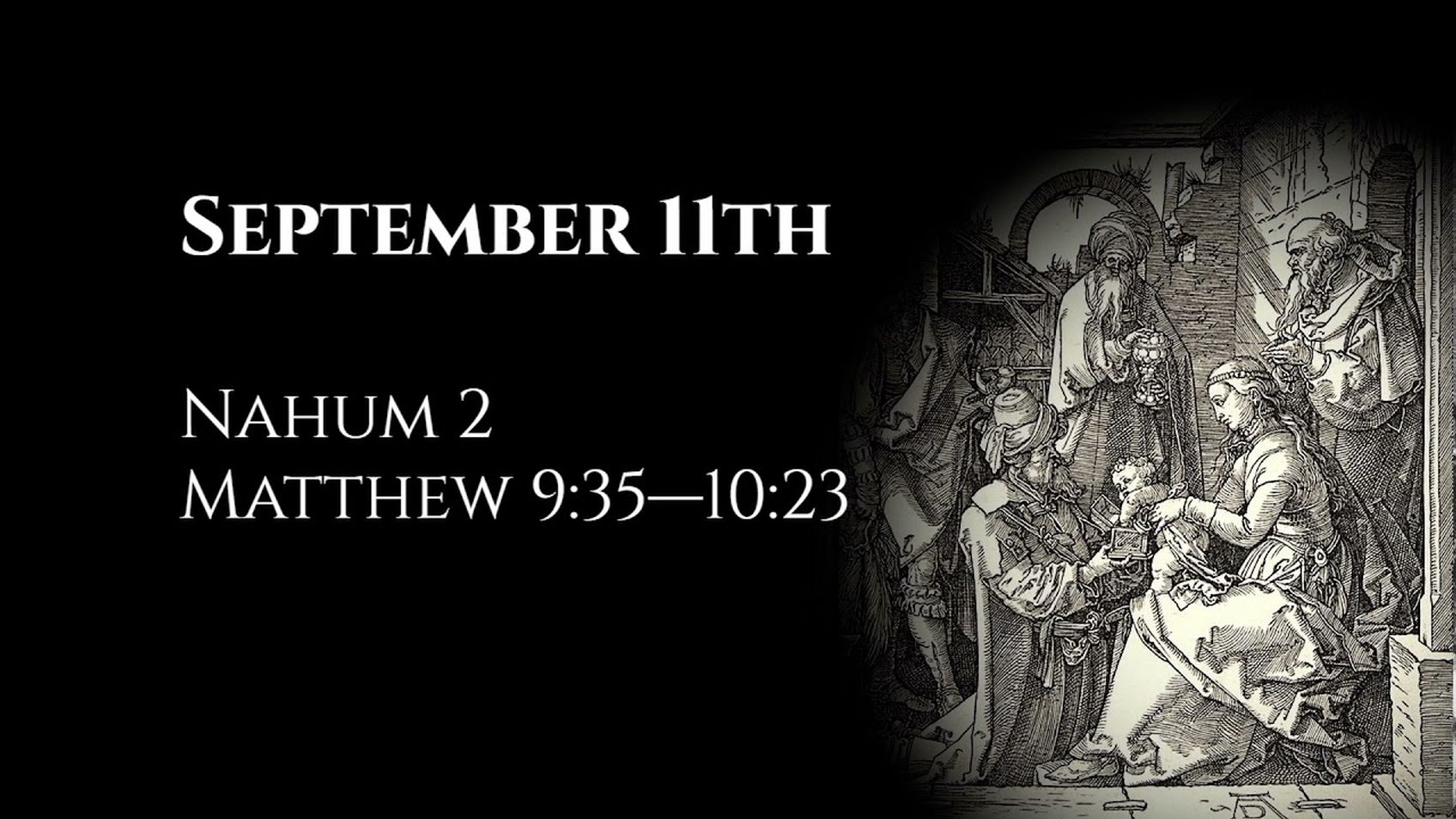September 11th: Nahum 2 & Matthew 9:35—10:23
September 10, 2021

Alastair Roberts
The downfall of Nineveh. Sending out the twelve apostles.
My reflections are searchable by Bible chapter here: https://audio.alastairadversaria.com/explore/.
If you are interested in supporting this project, please consider supporting my work on Patreon (https://www.patreon.com/zugzwanged), using my PayPal account (https://bit.ly/2RLaUcB), or buying books for my research on Amazon (https://www.amazon.co.uk/hz/wishlist/ls/36WVSWCK4X33O?ref_=wl_share).
You can also listen to the audio of these episodes on iTunes: https://itunes.apple.com/gb/podcast/alastairs-adversaria/id1416351035?mt=2.
More From Alastair Roberts

Christian Reconstruction in the Pacific Northwest (with Crawford Gribben)
Alastair Roberts
September 11, 2021
Crawford Gribben, author of the book 'Survival and Resistance in Evangelical America: Christian Reconstruction in the Pacific Northwest' (https://amzn

September 12th: Nahum 3 & Matthew 10:24-42
Alastair Roberts
September 11, 2021
The justice of Nineveh's overthrow. The lot of the disciple.
My reflections are searchable by Bible chapter here: https://audio.alastairadversaria.co

September 13th: Habakkuk 1 & Matthew 11
Alastair Roberts
September 12, 2021
Habakkuk's dismay at the rise of Babylon. Messengers from John.
My reflections are searchable by Bible chapter here: https://audio.alastairadversaria

September 10th: Nahum 1 & Matthew 9:18-34
Alastair Roberts
September 9, 2021
The wrath of the jealous God against Nineveh. The healing of the ruler's daughter and the woman with the issue of blood.
My reflections are searchabl

Natural Law and Scriptural Authority Davenant Hall Course
Alastair Roberts
September 9, 2021
Brad Littlejohn and I will be teaching a course on Natural Law and Scriptural Authority in the forthcoming Davenant Hall Fall Term. If you are interes

September 9th: Micah 7 & Matthew 9:1-17
Alastair Roberts
September 8, 2021
Finding hope in a time of betrayal. New wine in new wineskins.
My reflections are searchable by Bible chapter here: https://audio.alastairadversaria.
More on OpenTheo

Life and Ministry in Charlotte and in the SBC with Clint Pressley
Life and Books and Everything
December 15, 2025
In a rare cultural anomaly that may never be repeated in our lifetimes, the current SBC President and current PCA Moderator live in the same neighborh

An Invitation to the 2026 Coram Deo Pastors Conference
Life and Books and Everything
February 18, 2026
"I love being a pastor, and I love pastors, which is why I hope you will consider joining us at the Coram Deo Pastors Conference in 2026." —Kevin DeYo

Is It a Sin to Feel Let Down by God?
#STRask
November 6, 2025
Questions about whether it’s a sin to feel let down by God and whether it would be easier to have a personal relationship with a rock than with a God

What Tools of Reasoning Help You Know What’s True, Right, and Good?
#STRask
December 4, 2025
Question about what tools of reasoning help us determine whether something is true or false, right or wrong, good or bad before bringing Scripture int

Conservatism and Religious Freedom with John Wilsey
Life and Books and Everything
October 27, 2025
What is conservatism? And why does it go hand in hand with religious freedom? How should we think about the American experiment of ordered liberty? Ha

Why Would Any Rational Person Have to Use Any Religious Book?
#STRask
December 8, 2025
Questions about why any rational person would have to use any religious book, whether apologetics would be redundant if there were actually a good, un

How Can We Know Who Is Teaching the Same Gospel Paul Taught?
#STRask
February 16, 2026
Questions about how we can know who is teaching the same gospel Paul taught, and whether or not Jeremiah 1:5 supports the idea that we pre-existed in

Why Does the Bible Teach You How to Be a Proper Slave Owner?
#STRask
November 13, 2025
Question about why it seems like the Bible teaches you how to be a proper slave owner rather than than saying, “Stop it. Give them freedom.”
* It s

Why Should We Pray If God Already Knows What’s Going to Happen?
#STRask
January 29, 2026
Questions about why we should pray if God already knows what’s going to happen, how the effectiveness of prayer is measured, and whether or not things

How Do You Justify Calling Jesus the Messiah?
#STRask
December 18, 2025
Questions about how one can justify calling Jesus the Messiah when he didn’t fulfill the Hebrew messianic prophecies, and whether the reason for the v

Why Are So Many Christians Condemning LGB People Just Because of How They Love?
#STRask
January 15, 2026
Questions about Christians condemning LGB people just because of how they love, how God can expect someone to be celibate when others are free to marr

Does God Really Need a “Pound of Flesh” to Forgive Sins?
#STRask
January 12, 2026
Questions about how to answer the challenge that God doesn’t need a “pound of flesh” to forgive sins but can simply forgive, and whether the claim in

Does Open-Mindedness Require Studying Other Religions Before Becoming a Christian?
#STRask
February 9, 2026
Questions about the claim that if Christians really want to be open-minded, they need to read and study other religions before committing to Christian

What Are Some Good Ways to Start a Conversation About God with Family Members?
#STRask
October 30, 2025
Questions about how to start a conversation about God with non-Christian family members, how to keep from becoming emotional when discussing faith iss

What Is Wrong with Wokeness? With Neil Shenvi
Life and Books and Everything
January 19, 2026
In this timely interview, Kevin talks to Neil Shenvi about his new book (co-authored with Pat Sawyer), entitled “Post Woke: Asserting a Biblical Visio
